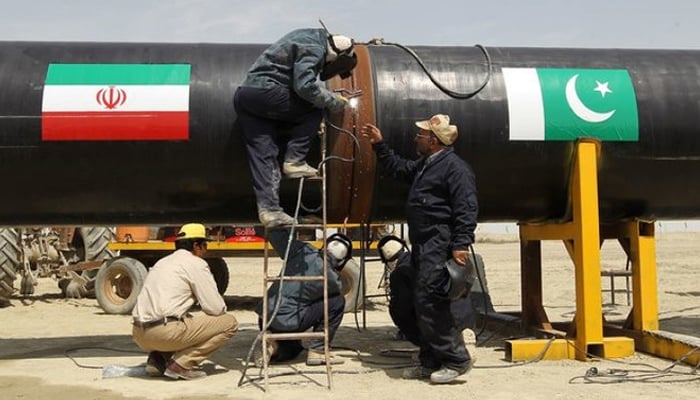Pakistan to ask US to waive curbs on Iran gas pipeline
The remarks from Malik came amid Pakistan’s efforts to navigate its energy needs while managing international sanctions and domestic challenges
ISLAMABAD: Pakistan is preparing to officially request a waiver from the American sanctions concerning the Pakistan-Iran gas pipeline project, with a finalised draft ready for submission to the US administration.
“We will seek exemptions from American sanctions as the Iran-Pakistan gas project cannot bear the burden of sanctions,” Petroleum Minister Musadik Malik said Monday in an unofficial conversation with the media.
The remarks from Malik came amid Pakistan’s efforts to navigate its energy needs while managing international sanctions and domestic challenges.
The caretaker government had previously delayed plans to file for an exemption to American sanctions due to evolving geopolitical circumstances. This effort aims to address Pakistan’s energy requirements while ensuring compliance with contractual agreements with Iran.
“We will present Pakistan’s case comprehensively and will try to seek exemptions by presenting political and technical reasons against American sanctions. The government will also engage in extensive lobbying to obtain exemptions,” reiterated Malik. He expressed hope that construction of the project would commence soon.
It is noteworthy that the caretaker government had previously approved the construction of an 80-kilometer pipeline on Pakistani soil, with decisions regarding the Pakistan-Iran gas pipeline project made by the ministerial oversight committee.
He expressed concerns over increases in gas prices and said, “Whether the dollar price decreases or increases, requests for price hikes come from companies.”
Regarding the implementation of sales tax on petroleum products, he commented, “I am not aware of the implementation of sales tax on petroleum products.”
Malik highlighted the disparity in access to gas facilities, noting that only 25 to 27 percent of urban areas have access while more than seventy percent of the population does not. However, he emphasised that 99 percent of the population is connected to the electricity system, advocating for the supply of cheap electricity as a solution to the problem.
Discussing electricity generation, Malik cited examples of power plants demonstrating efficiency but noted the escalation in per-unit cost due to expensive RLNG (re-gasified liquefied natural gas).
Citing examples, he noted that Bhikki and Haveli Bahadur Shah power plants had demonstrated greater efficiency. However, the per unit cost of electricity escalated to Rs22-26 due to the expensive RLNG. Meanwhile, electricity generated from local gas costs Rs10-12 per unit, with some private companies producing electricity at Rs6 per unit.
He suggested that six LNG power plants could operate on local gas to produce cheap electricity and emphasised efforts to conserve gas while providing affordable electricity to the people. Malik also mentioned the import of oil through private channels from Russia and addressed the issue of circular debt in the energy sector, stating that reforms would be necessary to tackle the five trillion rupees circular debt.
-
 Savannah Guthrie Sends Desperate Plea To Mom Nancy Kidnapper
Savannah Guthrie Sends Desperate Plea To Mom Nancy Kidnapper -
 NBA All-Star 2026 Shake-up: Inside The New USA Vs World Tournament Format
NBA All-Star 2026 Shake-up: Inside The New USA Vs World Tournament Format -
 Warner Bros Consider Reopening Deal Talks With Paramount, Says Reports
Warner Bros Consider Reopening Deal Talks With Paramount, Says Reports -
 Andrew Mountbatten Windsor Faces Future With UK MPs, Says Expert
Andrew Mountbatten Windsor Faces Future With UK MPs, Says Expert -
 Shamed Andrew Told 'nobody Is Above The Law' Amid Harrowing Silence
Shamed Andrew Told 'nobody Is Above The Law' Amid Harrowing Silence -
 Gisele Bundchen Melts Hearts With Sweet Bike Ride Glimpse Featuring Son
Gisele Bundchen Melts Hearts With Sweet Bike Ride Glimpse Featuring Son -
 Prince William Found Meghan Markle ‘quite Refreshing’ At Start
Prince William Found Meghan Markle ‘quite Refreshing’ At Start -
 Kate Middleton Knew Should Could Not Be ‘voice Of Reason’ With Prince Harry
Kate Middleton Knew Should Could Not Be ‘voice Of Reason’ With Prince Harry -
 Rihanna Has Wardrobe Malfunction At A$AP Rocky Fashion Show
Rihanna Has Wardrobe Malfunction At A$AP Rocky Fashion Show -
 Prince Harry Felt System Had ‘one Rule For Him, One For Prince William’
Prince Harry Felt System Had ‘one Rule For Him, One For Prince William’ -
 Jake Paul's Fiancée Sends Him Over The Moon Over Stunning Victory
Jake Paul's Fiancée Sends Him Over The Moon Over Stunning Victory -
 Harper Beckham Sends Valentine’s Love Amid Brooklyn Family Drama
Harper Beckham Sends Valentine’s Love Amid Brooklyn Family Drama -
 Why Prince William, Kate Middleton 'partnership' Is Important For Monarchy
Why Prince William, Kate Middleton 'partnership' Is Important For Monarchy -
 Katie Price Drama Escalates As Family Stays In Touch With Ex JJ Slater
Katie Price Drama Escalates As Family Stays In Touch With Ex JJ Slater -
 Critics Target Palace Narrative After Andrew's Controversy Refuses To Die
Critics Target Palace Narrative After Andrew's Controversy Refuses To Die -
 Sarah Ferguson’s Delusions Take A Turn For The Worse: ‘She’s Been Deserted’
Sarah Ferguson’s Delusions Take A Turn For The Worse: ‘She’s Been Deserted’




